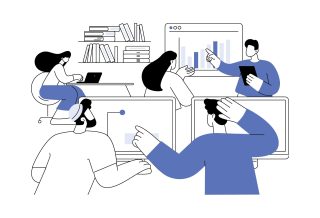FOCUS
Make every minute count, for educators and students
By Suzanne Bouffard
Categories: Evaluation & impact, Fundamentals, Learning designsAugust 2023
Time is a perennial challenge for educators, one that is embedded in nearly all conversations about professional learning. The topic has been discussed in some form in nearly every issue of The Learning Professional, but it’s so fundamental that we periodically shine a spotlight on it with time-themed issues.
While the challenges of prioritizing and structuring time for professional learning aren’t new, the context in which we’re navigating them has changed. As schools and the people in them aim to recover from the pandemic, it’s safe to say we’re in an educational crisis. Forty years after the landmark report A Nation at Risk lit a fire under American education, we’re dealing with fires of a different nature and scale.
In this context, every minute counts. As Joellen Killion writes in this issue, we can’t make more time; we can only make choices about what we prioritize and how to allocate the time we have. Prioritizing professional learning time is a wise investment because it can help address schools’ urgent goals and students’ compounding needs.
This issue is driven by vital questions about how to find and organize time. How do we shift existing structures and resources to make the time educators need for professional learning that will help them meet today’s challenges? How do we spend the time we have to ensure meaningful learning that leads to changes in practice and student outcomes? How do we communicate the importance of professional learning time to stakeholders inside and outside of school buildings to promote and preserve that time?
This issue includes strategies for prioritizing time, like reflecting on assumptions about the nature and availability of time (see article), focusing on priorities (see article), and deciding what not to do (see article). It also shares insights that might be surprising to some readers, like how workshops can drive an ongoing learning agenda (see article), why hours may not be the best way to measure learning (see article), and how school boards play a role in supporting professional learning time (see article).
We believe educators are more than ready to tackle the challenge of finding time to learn. According to the Teaching and Learning International Survey, which included about 260,000 teachers in 48 countries, teachers across the world rated “offering high-quality professional development” in their top three spending priorities (Schleicher, 2019). In a study of time use in nearly 4,000 U.S. schools, teachers said the aspect of time they would most like to change is “staff professional time.” Yet the same study found that a large percentage of teachers spend less than two hours per week collaborating with their colleagues (38% of elementary and 43% of secondary teachers), and only about half of middle and high school teachers have a common planning period with their colleagues (Silverman et al., 2020). There is clearly room for improvement and a desire for change.
In addition to the resources in this issue, I encourage you to use Learning Forward’s workbook Establishing Time for Professional Learning, available on our website. An excerpt is included in this issue’s Tools section. I also invite you to join our webinar on “Finding Time for Professional Learning” at 3 p.m. Eastern Time on Sept. 21. Bring your questions and ideas and learn from other educators to make the most of your time well beyond that hour.
References
Schleicher, A. (2019). What do teachers tell us about their work and what matters to them? OECD.
Silverman, S., Swan, K., Ziolka, S., & Bó, B. (2020). Time for change? Findings from a survey of time use in schools. Unlocking Time.

Suzanne Bouffard is senior vice president of communications and publications at Learning Forward. She is the editor of The Learning Professional, Learning Forward’s flagship publication. She also contributes to the Learning Forward blog and webinars. With a background in child development, she has a passion for making research and best practices accessible to educators, policymakers, and families. She has written for many national publications including The New York Times and the Atlantic, and previously worked as a writer and researcher at the Harvard Graduate School of Education. She has a Ph.D. in developmental psychology from Duke University and a B.A. from Wesleyan University. She loves working with authors to help them develop their ideas and voices for publication.
Categories: Evaluation & impact, Fundamentals, Learning designs
Recent Issues
LEARNING DESIGNS
February 2025
How we learn influences what we learn. This issue shares essential...
BUILDING BRIDGES
December 2024
Students benefit when educators bridge the continuum of professional...
CURRICULUM-BASED PROFESSIONAL LEARNING
October 2024
High-quality curriculum requires skilled educators to put it into...
LEARNING TO PIVOT
August 2024
Sometimes new information and situations call for major change. This issue...












